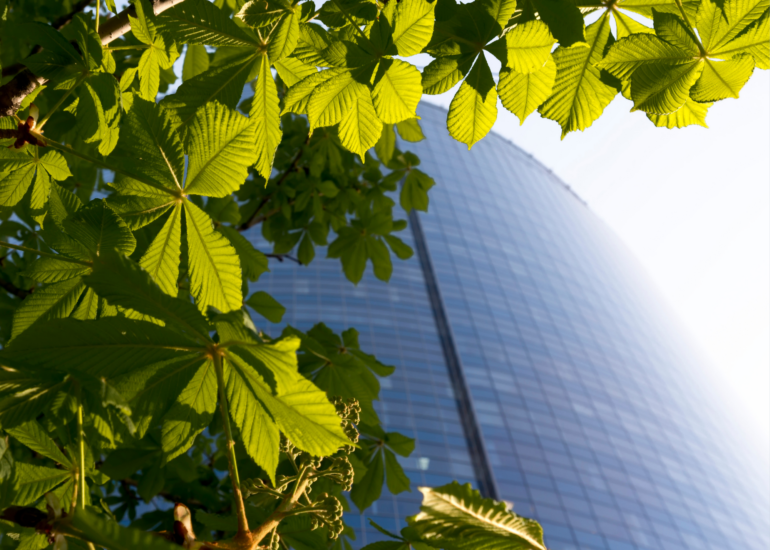Though it has its carved out spaces of greenery and occupies the northern tip of the prairie state, Chicago is still primarily a concrete jungle, removed from the nature it emerged from. To combat the aggressiveness of metropolitan living on human lifestyles, there are Chicago-based companies and firms looking to undo some of the damage.
Some of the thought-leaders and pioneers of environmental sustainability in the Windy City joined the “Loyola Leading for Good: Growing the Funding for Nature” virtual event, held May 19, to discuss the work being done now and the yet-to-be-imagined work of the near future. The discussion was introduced by Megan Yamauchi, COO of Trouvaille Innovations LLC and Tayyaba Ali, COO of Trouvaille Innovations LLC; paneled by Molly Meyer, CEO and Founder of Omni Ecosystems and Rick Saines, Partner at Pollination; and, at the helm, moderated by Karen Weigert, Director of the Loyola Baumhart Center.
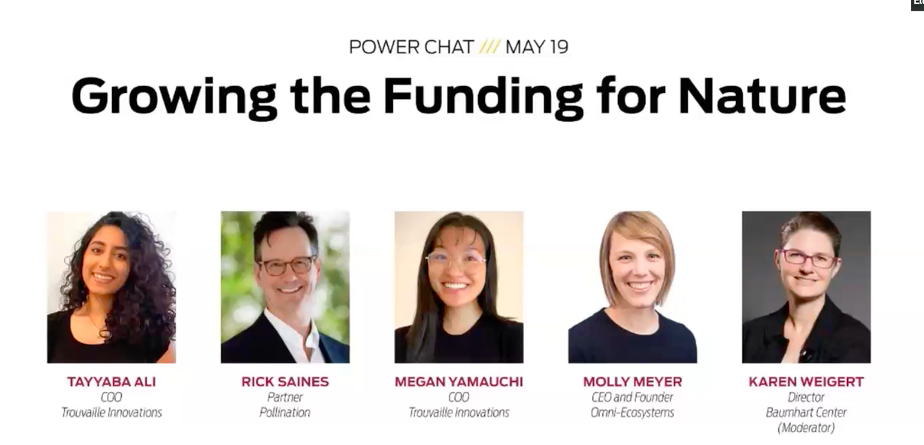
At the top of the discussion, Yamauchi and Ali introduced attendees to their company, Trouvaille Innovations LLC, a recent winner of the Abrams Sustainable Business Challenge, presented by Loyola University. The company offers disaster-proof, filter-equipped water bottles that come to the aid of communities affected by poor infrastructure and marred by climate change-driven disaster.
The topic of poor infrastructure was voiced by all participants in the Loyola-facilitated discussion. Conversation touched on how toxins from old pipe systems that deliver water affect the day-to-today lives of citizens, primarily those in under-served communities. Launching into the core of the discussion, Weigert then offered this question to the group, “How do we have a healthy, thriving environment in which to live, work, play and learn?”
She then reminded the audience that Chicago is also called the “city in a garden” and posed a question.
“We spend all of our time inside buildings that are in and around this garden. What if the buildings and the businesses … were strengthening the garden, not just here in Chicago but around the world? What if growing a business actually meant growing nature?”
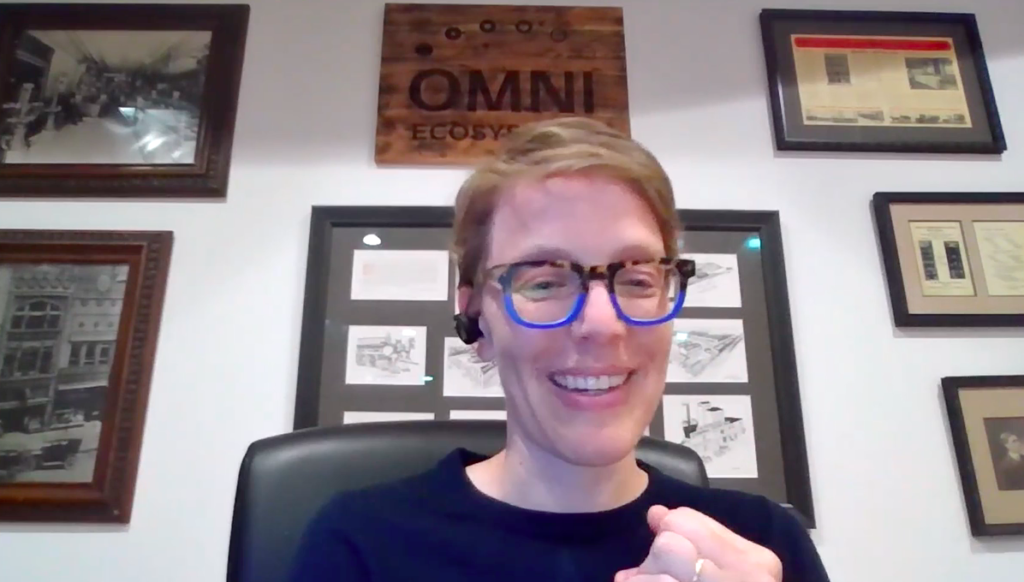
The first member of the discussion to address this was Molly Meyer — CEO and Founder of Omni Ecosystems, which designs and maintains green roof systems, living walls and working landscapes, or in other words, they “integrate science and design to create landscapes that make the built environment more resilient,” Meyer said.
To begin, Meyer stated that “Nature needs to be at the forefront” of what we do whether that is from a business standpoint or a personal mission. Further, she suggests that what may entice people to a nature-first policy shift is that, often, it can be more cost-effective.
Saines — a career environmental lawyer now turned Partner at Pollination, a specialist climate change investment and advisory firm — then spoke to the crossroads of the needs of a city and the avenues in which to meet those needs.
“We do the law as a way of really getting ground truth insights at the transactional level to really understand how the markets are moving. … So, if you’re not doing it at the transactional level you don’t understand how you create these monetizable attributes for nature. … Nature actually does provide really valuable economic services. In its simplest form, you can think of nature’s infrastructure.”
While we can institute our man-made solutions as much as we like, the fact remains that each of them has a ceiling, to which Saines asks “Well, what can nature do?” When on the topic of carbon — an issue often at the center of many companies’ sustainability practices — Saines mentioned one of nature’s great feats: trees. With the hope that as more trees are planted and fewer are ripped from the soil, he states that there is a quantifiable value to nature that exists with or without our interference.
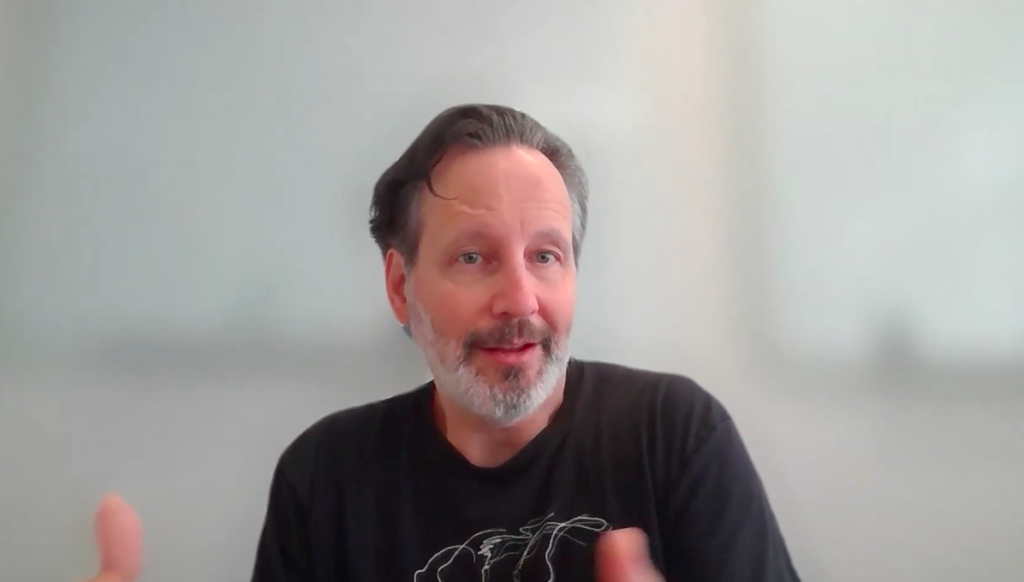
Meyer then shared one of the quantifiable attestments to her company’s practices. A “case study” in which two identical buildings were compared, with the pivotal difference that one building was equipped with private green spaces. What they found was that while on the front-end more money was needed to create these spaces, on the back-end they then had an increase in market value, even up to an additional $90,000 — compared to a unit that had no access to a green space.
This market trend during the in-between time of the pandemic — as employees are slowly migrating back to their offices — has put pressure on companies who have to strategize what will bring the in-person team back. And as Meyer’s work suggests, the enticement of green spaces is all the rage for employees used to the laxer nature of at-home working. Weaving green elements — such as outdoor meeting rooms and open-air spaces where people can have lunch — into an otherwise “gray building” is key moving forward, suggest both Meyer and Saines.
On different ends of the same battle — Saines’ work being on the macro-level and Meyer’s being on the micro — Saines is certain the work that will in real-time make the most difference is that of companies like Omni Ecosystems, whose work will impact localized, day-to-day lives.
Looking forward, both Meyer and Saines hint that what is to come next is tangible if not already in the works — such as the idea that “We could have almost 10 million pounds of grain every single year from rooftops, and that could yield 50 million bottles of beer, every year from Chicago,” Meyer shared from the pulled data of one of her project’s.
“[Connecting] nature and people in our daily lives, and [doing] so in a way that both enhances nature and doesn’t break the pocket book,” Meyers said. “There’s so much that can be done that we haven’t even touched.”
More from Better:
- Best of Chicago & the Suburbs: Vote for Best of 2022
- You Said It: Tired of Pretending at Work? Here Are 5 Ways to Practice Wellness in the Workplace
- 30 of the Best Things to Do in Chicago and the Suburbs in June 2022
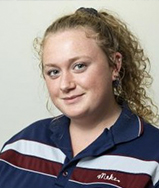
Margaret Smith is a Chicago-based writer and editor with a passion for socio-political storytelling about their community. They are a graduate of Columbia College Chicago.
